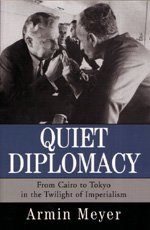LETTERS FROM THE GLOBAL PROVINCE
“Silence is more musical than any song.” – Christina Rossetti
Invisible Men. When the shouting is over, and the Obama administration has become a memory, we may discover that its heavyweights went about their business largely unnoticed by the motor mouths on cable TV and the gossipy op-ed columnists at the metropolitan newspapers. Paul Volcker and James L. Jones come to mind. The wise men of this administration, they have largely kept out of the spotlight. But our wellbeing will largely be determined by how closely President Obama follows their advice. Volcker, a onetime Fed Chairman who rescued us once before, has been whispering sane thoughts to the president about sound reforms of the financial system and much more. He wants to once again separate commercial banking and investment banking in hopes of restoring rational lending practices and reasonable risk taking to our financial sector.
Jones has been even more invisible and yet he’s known to be a sensible voice on security issues, not given to military adventurism and cowboy diplomacy. Along with Volcker, he maintains a modest demeanor.
 Perhaps more surprising is the low key way Richard C. Holbrooke and George Mitchell have carried out their duties as special envoys in the Middle East, Afghanistan, and Pakistan. Both previously have been much in the limelight. The New York Times notes as much in “Glittering Emissaries’ Dazzle Wears off in the Trenches.” The Times does not get it: it thinks they’re out of the news because they’re mired in impossible tasks. Rather, it’s the style in this administration to do one’s job fairly quietly, and give theatrics a rest. Holbrooke and Mitchell, as well as Secretary of State Clinton, have put new meaning in the term “quiet diplomacy.”
Perhaps more surprising is the low key way Richard C. Holbrooke and George Mitchell have carried out their duties as special envoys in the Middle East, Afghanistan, and Pakistan. Both previously have been much in the limelight. The New York Times notes as much in “Glittering Emissaries’ Dazzle Wears off in the Trenches.” The Times does not get it: it thinks they’re out of the news because they’re mired in impossible tasks. Rather, it’s the style in this administration to do one’s job fairly quietly, and give theatrics a rest. Holbrooke and Mitchell, as well as Secretary of State Clinton, have put new meaning in the term “quiet diplomacy.”
Obama Campaign 2008. Ryan Lizza’s “Battle Plan: How Obama Won,” in The New Yorker, detected this same flight from bombast and huzzerai in Barack Obama’s run up to the presidency. The theme was “no drama with Obama,” and a premium was placed on low profile, diligent people who kept their egos in check:
Plouffe, who is forty-one, is thin and discreet, and his low profile in the press sent a message throughout the Obama organization that staffers were to be similarly reticent about attracting publicity. The catchphrase inside the campaign was “No drama with Obama,” and Plouffe channeled the low-key temperament of the candidate himself. “Barack went out and sought people who had a certain personality type,” Pfeiffer said. “They were people who had intentionally low profiles in Washington.” Of Plouffe, Pfeiffer said, “If he had wanted to spend the past five years of his life on ‘Crossfire’ and CNN, he could do that. He’s chosen not to do that.” When, in January, 2007, Pfeiffer interviewed for his job, Obama told him, “What I want around me are people who are calm, who don’t get too high and don’t get too low, because that’s how I am.”
Alyssa Mastromonaco, the director of scheduling and advance, who had also worked for Kerry in 2004, said that she had some trouble getting used to the quieter vibe of the Obama operation. “When I first started on the campaign, at the very beginning of this one, I was one of the only people who had actually done a Presidential before,” Mastromonaco, who is thirty-two, told me. “And so we were on some conference call, and I was just completely irritated by something someone was saying. After the call, they came in and were, like, ‘Alyssa, this is a campaign where you need to respect other people’s opinions and you can’t be a bitch.’ I was, like, ‘Oh, my God, these guys are serious!’ ”
There’s a need for better conference calls in organizations around the globe where such pettiness is cast aside, and measured discourse prevails.
Sony After Morita. Sony Corporation, the great Japanese corporation that brought us the Walkman and so much else, has floundered ever since the demise of its founder and prime mover Akio Morita. Much like the old Hewlett Packard, it was unduly dominated by a pack of engineers, all determined to go their own separate ways without regard to the whole of the company. It was beribboned with product successes—and often offered much higher quality andfinesse than its competitors. But it also fostered fiefdoms that could not work together and that often ignored both the whims of customers and the demands for profitability imposed by  global capitalism. Just as the carmaker Nissan turned to Carlos Ghosn for resuscitation, Sony finally brought in a foreigner, Sir Howard Stringer, to recreate its culture and ensure that each individual and each of the parts would start usefully talking to each other. There are now encouraging signs that he is beginning to tie together its many brainy individuals to form a collective intelligence.
global capitalism. Just as the carmaker Nissan turned to Carlos Ghosn for resuscitation, Sony finally brought in a foreigner, Sir Howard Stringer, to recreate its culture and ensure that each individual and each of the parts would start usefully talking to each other. There are now encouraging signs that he is beginning to tie together its many brainy individuals to form a collective intelligence.
Most recently, we have seen how this works out at Sony Pictures Entertainment. There Stringer has installed co-chief executives—Amy Pascal and Michael M. Lynton. They have not produced huge, high quality blockbusters or breakthrough revenues, but their bottom line has been consistently good. In “Sony’s Version of Tracy and Hepburn,” we learn that his analytical style has more than contained risk, while her powerful intuition has produced some decent winners. “While keeping tight reins on their budget, Ms. Pascal and Mr. Lynton have also tried to change the hierarchical culture of the studio by creating a campus-style environment and eliminating executive perks like the corporate dining room (in favor of a commissary where rank-and-file eat alongside top management).” “More important, in addition to playing down their personal rivalry, they have shown a willingness to set aside corporate rivalries within Sony. The studio has worked more closely with the company’s electronic division, a sharp contrast to previous practices at the studio.”
“The two have a conference room adjoining their offices, and this is where they iron out their differences.” Egos have been subdued: the conversations produce decisions, rather than rancor and division. To re-iterate the Obama mantra, there’s simply a lack of drama. Even though this is a movie business.
Free Association. On the Global Province, we have claimed that the predominant catalyst for organizations that would seek to be global is not mergers and acquisitions, but alliances where companies, governments, and others cooperate freely even though they have no fiscal or legal bonds, but instead move in concert because they have the will to work together. We call this “Free Association.”
What we did not make clear there is that alliance-making requires a temperament and decorum that is very much counter to the age of celebrity. No entity, no matter its competitive advantages, that wishes to operate on a global scale has the resources or the implicit power to be effective on a go-it-alone basis. What’s required is a culture that celebrates gentle dialogue between those inside the walls of an organization and with those in other institutions 25,000 miles away. This requires people who are in control of their mouths and their egos.
Interoperability. In future issues we will talk a bit about interoperability. It is, of course, a gobbledygook word that means a lot of things. For computer guys it refers to the ability of different systems or software to work seamlessly with one another. Consultants, on the other hand, would say that it means to knock down smokestacks (i.e., departmental insularity), so that different parts of an organization can connect with one another, and different organizations can interact with each other.
Even in life and death situations, it’s hard to get people to cross boundaries. Pearl Harbor and September 11 are prime examples where intelligence did not flow through government and did not get acted upon. Health care experts prod us to pay for new information technologies, but hospitals have a tough time moving data they already have in hand to achieve economies and wellness.
The paradox, then, is that we wind up optimizing the parts while even hurting the total system. Lots of sub-optimization and macro mishmash. That is what’s at question here. Can we achieve pervasive interoperability in a world that is not working particularly well at the moment?
 P.S. Thorbjorn Jagland, head of the Norwegian Nobel Peace Prize Committee that recently awarded the prize to President Obama by a unanimous vote, stated simply the bottom line reason for the this distinction. “What he did was to go to Cairo and reach out to the Muslims. There must be a starting point, and this was a very important starting point.” In the present circumstance, peace is seen as coming from stepping across boundaries and having a conversation. In business we call this “walking around.”
P.S. Thorbjorn Jagland, head of the Norwegian Nobel Peace Prize Committee that recently awarded the prize to President Obama by a unanimous vote, stated simply the bottom line reason for the this distinction. “What he did was to go to Cairo and reach out to the Muslims. There must be a starting point, and this was a very important starting point.” In the present circumstance, peace is seen as coming from stepping across boundaries and having a conversation. In business we call this “walking around.”
P.P.S. Politicians in both the United States and Great Britain are resisting attempts to bring gun-slinging financial institutions under control. As we’ve hinted, all sorts of self interested parties are lobbying madly to stop Volcker’s old-fashioned idea: keep the banks apart from the Wall Street tribe and we will all be better off. Mervyn King, head of the Bank of England, has argued for much the same in the UK, and was heavily rebuked by Gordon Brown, the hapless PM, who is now himself on borrowed time. Brown makes noises about reforming the global financial system, but reform begins at home—something he is avoiding. The mini-Depression from which we now suffer has hit hardest in the U.S. and England, the countries where the big financial institutions are most out of control. Kevin Phillips, whose last book was Bad Money: Reckless Finance, Failed Politics, and the Global Crisis of American Capitalism, recognizes the relationship of America’s shotgun finance and its other problems.
Home - About This Site - Contact Us
Copyright 2009 GlobalProvince.com